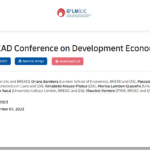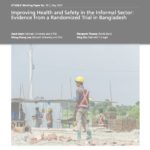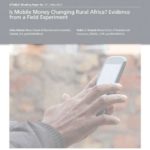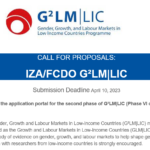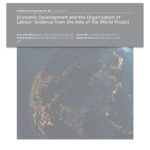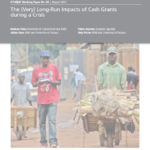G²LM|LIC and the Bureau for Research and Economic Analysis of Development (BREAD) are pleased to announce a joint Conference on Development Economics which will take place on Friday, December 15 and Saturday, December 16 in Nairobi, Kenya. The conference will consist of presentations of advanced stage research by senior or junior researchers, and presentations of…
Uncategorized
Improving Health and Safety in the Informal Sector: Evidence from a Randomized Trial in Bangladesh
Workplace accidents and hazards carry significant economic costs and harm to workers’ health and productivity. However, improving occupational health and safety (OHS) measures can enhance operational efficiency, benefiting worker well-being, firm productivity, and profitability. This is particularly important for small and medium-sized enterprises (SMEs) and the informal sector in low- and middle-income countries (LMICs). To…
Is Mobile Money Changing Rural Africa? Evidence from a Field Experiment
A new study has shed light on the potential of mobile money to accelerate urbanisation and structural change in Sub-Saharan Africa. The study, conducted in Mozambique, builds on a growing body of literature that highlights the role of mobile money in reducing transaction costs and improving financial inclusion in developing countries. The goal of the…
Girls’ Night In? Effects of the Kenyan COVID-19 Lockdown on Web Browsing
This study examines gender-based differences in the effects of the COVID-19 pandemic lockdowns on digital time use and activity in Kenya. The authors collected novel data online during the lockdown, combining survey responses from 316 Kenyans with their individual internet browser histories spanning the prior 90 days. This data set includes over 3.9 million unique…
G²LM|LIC Mentoring Programme
We are pleased to announce the launch of a mentoring programme for young researchers from low-income countries doing research in applied microeconomics. Mentees will have a unique opportunity to work with esteemed G²LM|LIC network mentors for guidance through a one-to-one mentorship to prepare a high-quality, publishable manuscript for a peer-reviewed journal. Please check the details here.…
Call for Proposals 2023
We are pleased to announce the launch of the second open call for proposals within the G²LM|LIC programme (phase VI of the overall programme). Large- and small-scale research grants are offered on issues related to gender, labor and growth in LICs. The deadline for submission is April 10, 2023. Please check the details here. We…
Economic Development and the Organisation of Labour: Evidence from the Jobs of the World Project
Labour is the sole endowment of the poor and the main factor of production in all economies. Therefore, understanding whether labour is employed efficiently is key to understanding poverty at the micro level and differences in national income at the macro level. In this working paper, the authors use the Jobs of the World database…
The (Very) Long-Run Impacts of Cash Grants during a Crisis
It is repeatedly argued that the potential effects of giving cash grants to poor people are constrained by the fact that this income group is trapped in poverty, generating little permanent income effect. However, the literature points to mixed results, not only within short- and longer-term evaluations, but also between them. Therefore, the timing of…
Childcare, Labor Supply, and Business Development: Evidence from Uganda
It is almost common knowledge that access to childcare is and has been fundamental for increasing women’s labor force participation in High-Income countries. However, it is not fully clear if the lessons drawn from such countries can be applied to contexts in low-income ones. Since in such settings evidence of the effects of childcare on…
Intergenerational Mobility in India: New Methods and Estimates across Time, Space and Communities
When thinking about the economic development of India in past decades there are two dominating points of view. On the one hand, that economic and political liberalization have increasingly led to a more equal society where intergenerational upward mobility has become more likely, while on the other, that India’s inequalities are persistent as ever. Approaches…
